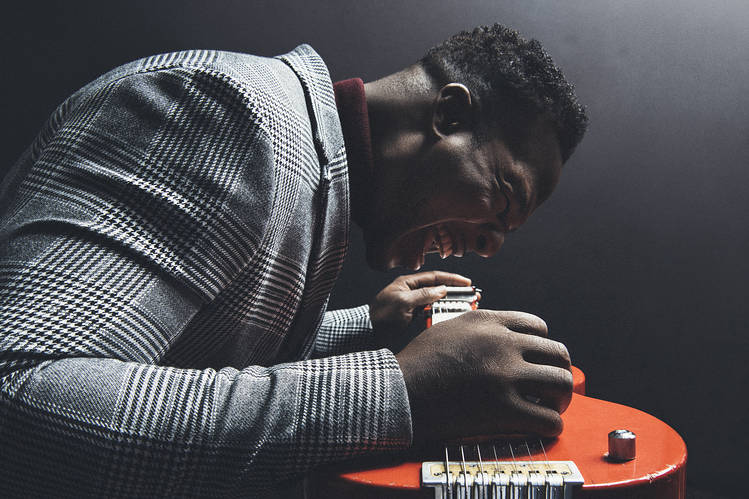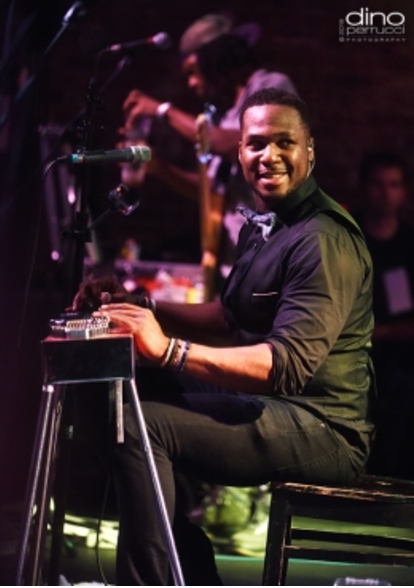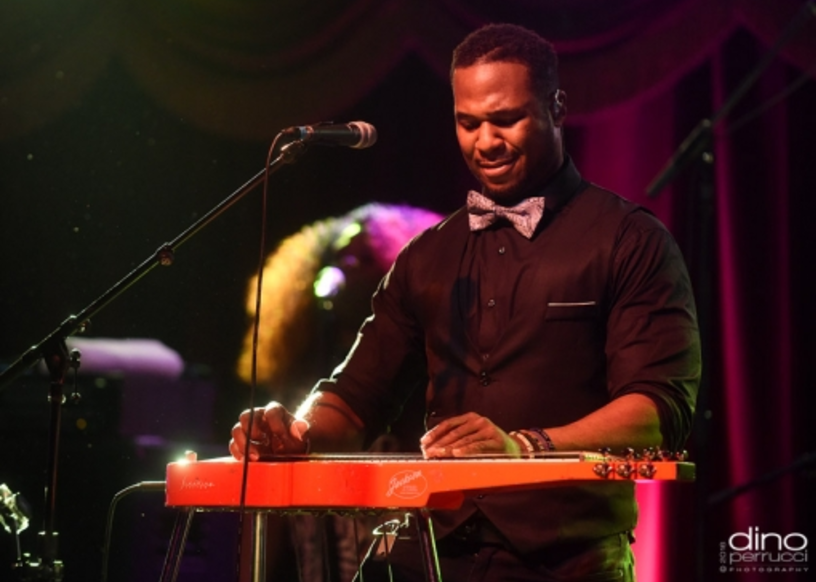Robert Randolph: A Soulful Salvation
 When Robert Randolph left the church, some called him the devil.
When Robert Randolph left the church, some called him the devil.
A squeaky wheel in high school, Randolph, now 38, was nonetheless a pedal-steel guitar prodigy who, more importantly, was determined to take the music he grew up with and turn it back on the world. His African-American Pentecostal place of worship, the House of God Church, was built on gospel music; the denomination was dominated by euphony. Almost 80 years ago, when black churches couldn’t acquire organs, a simpler, smaller instrument was substituted: pedal-steel guitar. The whimper and wail of the strings made for a fine imitation of a singing voice. From this, over the decades, “sacred steel” became the church’s signature sound.
But the church insisted that sound stay inside—and the hardcores didn’t want Randolph to leave the House. Some of his heroes had been browbeaten into keeping their talents within the radius of the church’s reach, only playing at services, conventions and in other places of worship across the East Coast and South. Randolph didn’t care about their insistence on resistance. He stepped out, with a defiant but positive attitude. He wanted to be like his idols but didn’t want to be contained the way they were.
“For me, I saw it much more as a worldwide thing,” Randolph says. “Like, the world needs to hear this music, this sound. And they’d say, ‘Aw, man, you the devil, man. Where you going?’”
The church isn’t shallow on influences and artists. Amazingly, Randolph developed his talent while hardly knowing anything about the mainstream. The only music he listened to until his late teens was Michael Jackson and gospel.
“Almost all of the music [Robert Randolph & The Family Band makes] comes, in some way, from our church’s library,” Randolph says. “There’s more tapes of church music that we could listen to than there are hours of Grateful Dead music we could listen to. My musical library, from watching Lorenzo Harrison, Ted Beard, Calvin Cooke—all of these guys were some of the best musicians. They would have been stars, but the thing about our church is it is a very strict church. They couldn’t leave because they would’ve been criticized. They would’ve been silenced, all these other nonsense things. For any artist that comes from a church—Aretha Franklin, Sam Cooke, Sly Stone—all those guys have been scrutinized. It’s like, ‘Hey, you’re the devil.’ I didn’t give one rat’s ass. It didn’t bother me. Not much bothers me other than my own failures.”
At the top of Randolph’s list of failures is all the music he’s floundered on recording. He’s annoyed by the thinness of his discography. It’s time that he’ll never get back. That’s going to change. It’s taken Randolph 15 years, but he says he’s about to hit the most potent, creative era of his life. “My failure would be not recording enough music, which ain’t going to happen anymore,” he says. “If you look at it, man, I came to the scene in 2001, and I got enough music to put out a new record every five months now. That’s just one of those things where I’m glad being back with Red Light [Management], with Sony—they understand. Miles Davis, Hendrix, The Beatles— that’s what they used to do. That’s what we’re here for.”
Robert Randolph & the Family Band released their fifth studio album, Got Soul, on Feb. 17. If Randolph gets his way, then this will kick off a period, over the next decade, of releasing albums every 14-18 months. That’s a pace mostly unmatched in contemporary music, but it’s welcome news for Randolph’s dedicated fan base, which has been craving a new album from his Family Band for four years. A boon: The group should find a wider audience, thanks to Got Soul. This album is their shortest— but most imaginative—one yet, and it will be pressed to vinyl in addition to being available for streaming and download on every mainstream digital music service. 
Randolph has an optimism bolstered by his hard-line intention not to rest. He’s done messing around. After 2013’s Lickety Split, the pedal-steel guitarist was sidetracked by good intentions. He switched managers, then went back to Red Light Management, and eventually signed with Sony Masterworks for Got Soul. But it was his desire to help out his hometown area of Irvington, N.J. that actually waylaid him the most. For years, Randolph tried to help build a community arts center that would help kids and teens. He attended meeting after meeting. He even brought James Dolan, the owner of the New York Knicks and CEO of Cablevision, to the town council. He had the infrastructure and ideas ready. He also had billionaire Paul Allen willing to back the project.
“You wonder why all the crimes are happening in these towns and in these cities. It’s because there’s no music and art outlets for these kids anymore,” Randolph says. “So what the hell else are these kids supposed to do? You tell kids to go to school for math, science and English. That doesn’t benefit everybody. Different things expand people’s brains and minds. As long as I’m helping kids—inner-city kids, the less fortunate, black, white, Latino, whatever. I know what music does for kids. It’s therapeutic. It opens up the brain, opens up the mind, opens up your heart. If it’s not an instrument, maybe it’s a dancer or a poet or art. Communication is music.”
Randolph remains frustrated; he’s the latest talent to come out of the area who was unable to win this type of battle. Queen Latifah, Wyclef Jean, Lauryn Hill, Redman, Naughty By Nature, professional athletes and successful producers in the music business: They all emerged from a 10-mile radius around East and West Orange, N.J., and, despite their effort, none of them have found a consistent footing in improving the neighborhoods through long-lasting community programs.
“They’ve all failed,” Randolph says. “It doesn’t matter for me. I just like to help future kids, inner-city churches, you know, because the church is where I learned this God-given gift.” The passion project stifled his music making.
“People would call me and, I’d be like, ‘Leave me alone, I’m at this school meeting. I’m at this town board meeting,’” Randolph says. “Week after week. And then you figure out a whole year and a half, two years, went by and these people have been jerking me around.”
Now, Randolph will travel to cities and communities around the country and donate to places committed to building up their neighborhoods by bolstering their arts scenes. He’s given thousands of dollars and, in the past few years, made appearances in Florida, Georgia, North Carolina, Illinois and California.
“There’s a lot of things that make communities work,” Randolph says. “Churches don’t do anything to help kids these days. I’m very critical of the government. Trust me, these churches ain’t Republican. We’re at a time right now where a lot of people need to step up. Yeah, Trump is cutting budgets, but churches make billions of dollars per year, and where does that money go? I ain’t no Trump fan. I really wasn’t no Hillary fan either, but I am a Democrat. It’s just time a lot of people step up. It’s why we wrote ‘Be the Change’ and ‘Gonna Be Alright.’ Those songs, and the album, have a message of how we can help each other. Because there’s a lot going on in the world, and a lot of people are stuck in complacency and just act like it’s not there.”
When Robert Randolph blew the lid off the Grammys in 2004, former high-school teachers contacted his parents, surprised to see him on television.
They thought he might well have been dead by then.
Randolph stumbled through high school, and then his life consisted of three focal points: church, playing music and gambling. He loved poker and blackjack. He’d win, burn through money, win, burn through more money.
“One day, it was just like, ‘I don’t even like this anymore,’” Randolph says. “What’s the point?”
Randolph’s meteoric rise from the sanctity of the church to sharing stages with legends like Carlos Santana, Eric Clapton, Buddy Guy and Dave Matthews Band is well known within the music world. What’s not is the devil-talk he faced as a teenager, followed by his unlikely leap from a law office to main festival stages. Randolph got a mailroom job at 17. Eventually, an attorney at a nearby firm asked if he’d like to work there. Within seven months, Randolph, who never considered going to college, was an assistant paralegal. By 2001, when he had just turned 22, he was making $65,000 per year and buying alligator-skin shoes and dapper suits.
Then, he gave it up.
“All of a sudden, I told them, ‘I’m going to quit and be a musician,’” Randolph says. “They [the lawyers] had no idea. ‘What the hell? We didn’t even know you played music.’”
It was the summer of 2001. One of the lawyers at the firm gave Randolph a check for $2,500, just to keep him stabilized early on. 
Flash-forward 15 years: Randolph is playing a gig in Morristown, N.J., in the summer of 2016. A typical melting-pot audience of Randolph’s fans includes a handful of white guys with AARP cards, one of them approaching 80 years old—all of them are lawyers, former colleagues of one of the most recognizable guitar talents in the world.
“It wasn’t money,” Randolph says. “It was what was fun. What did I love to do? Music is kind of what got me here. I grew up in rough neighborhoods in Jersey, so music was my outlet in getting out of that. When an agent called me up, I think I was more excited to go to California—because I had never been. That someone would pay me to go to California and play music? OK, let’s do this.”
Randolph teamed up with producer Matt Pierson for Got Soul, and the results provide a tight punch with a typically uplifting Family Band groove and verve. It feels like a collaborative effort between artistic ideas and a veteran producer’s editorial instincts. Randolph’s Family, most notably his sister Lenesha and cousin Marcus, are more prominent on this record than on any prior one. Darius Rucker guests, naturally, on “Love Do What It Do,” while R&B songster Anthony Hamilton adds a great touch to “She Got Soul.” Snarky Puppy’s Cory Henry hops on to help during the Sam & Dave classic “I Thank You,” which Pierson pitched to Randolph as a cover-song option.
Pierson, who was part of Randolph’s first record-deal signing nearly 15 years ago, intended to keep the LP exploratory but tight. It’s a streamlined 45-minute listen. His goal of getting to the element of The Family Band’s sound, without drowning in their potential, was the other challenge.
“It’s this space that exists between soul, R&B, funk, gospel and jamband,” Pierson says. “There’s a place in there that’s Robert. I don’t view it as he’s combining all of those. It’s that he is one-of-a-kind and can appeal to all of those other genres. Making a recording, I thought it was important to focus on what Robert’s really all about. If we focused on that, then each of those audiences would connect with it. Obviously, it’s a level of virtuosity on a rare instrument. There’s this sound of that guitar that’s undeniable.”
Pierson and Randolph started with a roster of 22 songs, eventually cutting it down to nine before writing a few more, including “Love Do What It Do,” which Randolph composed with bandmates on a screened-in porch in Nashville while recording the album. Randolph almost asked Chris Stapleton to sing on it, but figured Rucker’s voice fit the song bette , and it was the last tune he picked to be on the LP. They did most of the recording at New York City’s Sear Sound. Pierson says the rhythm tracks were finished in three days’ time and, in total, the album was recorded and overdubbed in less than two weeks, a process that ran counter to most of Randolph’s previous studio sessions. Pierson believes more takes lead to lesser returns. He doesn’t belabor the process. The album’s solo piece, “Heaven’s Calling,” was a happy accident, something that Randolph was warming up on before Pierson realized he had a worthy moment that fit in the middle of the album.
“He played for maybe five minutes, and it got to this moment where it’s like, ‘This is ridiculous,’” Pierson says. “I hope this is a record for those who know about Robert to say, ‘Ah, this is the record I’ve been wanting from him.’ If you knew about Robert, this is the one you’ve been wanting. If you didn’t know about him, this is the perfect introduction.”
Randolph feels settled, finally. He openly admits to missteps over the past six or seven years.
“Like most artists, we all make dumb decisions, and there’s a lot of good people there,” Randolph says of his relationship with Red Light. “Coran Capshaw, Bruce Flohr, my current manager, Jonathan Azu. We know how to talk to each other when we get angry with each other, so it’s all great. I’m happy to be back there with those guys and have their support. It’s funny to come sort of full circle. Anybody who’s followed my career would understand I’ve met so many important people and, you know, sometimes you can sort of lose yourself. I mean you can kind of get out of it because one thing artists do is we look at the charts and say, ‘Why the hell is Gary Clark Jr. more famous than me right now? Why the hell is Train?’ I’m just naming names. It can get you out of who you are. For me, no matter what I’m trying to do, it will revert to Robert Randolph & The Family Band: an inspiration, a rock-blues crossover guy who produces uplifting, positive music that comes from within.”
Randolph already has a list of collaborators he wants to work with soon: Trey Anastasio, Zac Brown, Dave Grohl, Red Hot Chili Peppers. This should be the start of his abundant period, if you will, and he’s still humble about the work.
“You make the mistake of saying, ‘We made it,’ [and] you kind of get complacent,” Randolph says. “Making it, to me, is if I’m in the Rock & Roll Hall of Fame one day. That’s it.”
As the conversation comes to a close, Randolph looks ahead to an evening of rehearsing and laying down demos—the usual.
“Ain’t no such thing as taking a break from music for me, man. Not no more.”



















